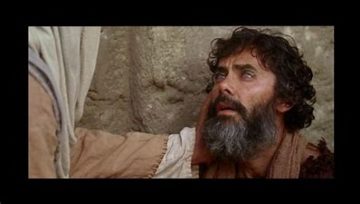In this Gospel for the Twenty-third Sunday of Ordinary Time Fr. Paul Gallagher, OFM offers a Scriptural Reflection that takes us on a journey with Jesus. This content is edited by Franciscan Sister of Christian Charity Sister Anne Marie Lom and Joe Thiel. The excerpts from the Sunday readings are prepared by Joe Thiel. To read or download the complete pdf with excerpts for your prayer, please click here: Franciscan Gospel Reflection September 5 2021 Excerpts are from the Lectionary for Mass for Use in the Dioceses of the United States of America, second typical edition © 2001, 1998, 1997, 1986, 1970 Confraternity of Christian Doctrine, Inc., Washington, DC. Used with permission. All rights reserved. No portion of this text may be reproduced by any means without permission in writing from the copyright owner. Images: Bartholomeus Breenbergh – Wikipedia
Mark 7:31-37
Again Jesus left the district of Tyre and went by way of Sidon to the Sea of Galilee, into the district of the Decapolis. And people brought to him a deaf man who had a speech impediment and begged him to lay his hand on him. He took him off by himself away from the crowd. He put his finger into the man’s ears and, spitting, touched his tongue; then he looked up to heaven and groaned, and said to him, “Ephphatha!” (that is, “Be opened!”) And immediately the man’s ears were opened, his speech impediment was removed, and he spoke plainly. He ordered them not to tell anyone. But the more he ordered them not to, the more they proclaimed it. They were exceedingly astonished and they said, “He has done all things well. He makes the deaf hear and the mute speak.”
Background:
Last week the gospel began with the Pharisees from Jerusalem questioning Jesus about why his disciples disregarded the ritual washing of hands before eating. At the end of that gospel Jesus tells his disciples that impurity comes from within a person, not from the outside. Mark continues his gospel describing Jesus’ interaction with a Greek woman who begged him to free her daughter from an unclean spirit. Jesus at first resists her request because of her ancestry, but then due to her faith and persistence Jesus responds and heals her daughter (Mark 8: 24-30). This interaction with the Syrophoenician woman leads into today’s gospel.
In the first verse of this week’s text, Mark describes Jesus’ travel route from Tyre to the Decapolis. The route is unusual. It indicates that Jesus traveled out of his way north to Sidon, then turned back south and ended up even further south than when he had begun. This route places Jesus clearly in the midst of Gentile communities. By taking the time to describe Jesus’ travel route, Mark wants his readers to be aware that Jesus went out of his way to arrive in Decapolis. Jesus is not letting the ritual impurity associated with contact with Gentiles deter his travels.
Mark’s description of the healing is distinct in that it is a typical story of healers of the day. The other gospel writers prefer to portray Jesus as healing by word alone, representing a more direct connection to the power of God. The miracle workers of the day touched the sick person, sometimes used a potion or saliva in the healing, and used some sounds or incantations in foreign tongues. The use of saliva was understood in Jesus’ culture to contain some of the personal power of the healer. Spitting was associated with confronting evil. His “looking up to heaven and groaning” could easily be understood as a prayer. Here Mark is portraying Jesus in a way that the Gentile community would be familiar with.
This account is also unique in that Jesus is healing someone who is deaf. In a primarily oral culture, hearing is extremely important. Those who cannot hear are at great disadvantage and are often ostracized. Being open to God was expressed as “listening to God.” Jesus’ own ministry was largely one of teaching about the Reign of God. When Jesus encounters this man, he takes him away from the crowd, off by themselves. He does not lay his hands on him, but rather puts his fingers into his ears and, with his own saliva, touches his tongue. He commands that they “be open” and immediately they are. Mark’s description includes more intimate details that are missing in other descriptions.
It is also worth noting that next week the gospel text will be Mark 8:27-35. In this familiar text Jesus will ask the disciples who the people are saying he is. Then he asks them who they say he is. Peter will declare “You are the Messiah.” (Mark 8:29) In some way, what Jesus is doing for the deaf man, opening his ears so that he can speak, he is also opening the minds of his disciples. Next week in the gospel, Peter will speak for the first time the truth that Jesus is the Messiah.
Reflection Questions:
- Can you recall an occasion when you took an unusual route along your journey? What circumstances led to the unusual route? What were you feeling during the journey and then afterward?
- Do you know people who are deaf? Were they deaf from birth? What would you most like them to be able to hear?
- Have you discovered that you have been deaf to the voice of God?
- What feelings or thoughts come to mind as you think of Jesus and his disciples taking this unusual route to get to the Decapolis?
- Imagine the disciples entering the region and encountering this deaf man. What time of day is it? What is the man doing? What sounds do you hear? Are you aware that he cannot hear those sounds?
- What part of this story holds the most fascination for you? What is that suggesting to you?
- Can you take some time now to talk to God about this gospel, your experience of being deaf or handicapped, how you felt when Jesus took the deaf man off by himself, or whatever arose within you from this gospel text?




Article Comments:
Sister Anne Marie Lom 09/04/2021 @ 8:21 pm
Having a hearing loss myself, I am touched by Jesus’s compassion and tenderness in this gesture of healing. Physical loss of hearing is not as difficult as unwillingness to hear truth and be empathetic! “Open our ears, Lord”.